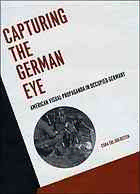
Capturing the German eye : American visual propaganda in occupied Germany PDF
Preview Capturing the German eye : American visual propaganda in occupied Germany
Capturing the German Eye Capturing the German Eye American Visual Propaganda in Occupied Germany Cora Sol Goldstein The University of Chicago Press Chicago and London Cora Sol Goldstein is associate professor of political science at California State University, Long Beach. The University of Chicago Press, Chicago 60637 The University of Chicago Press, Ltd., London © 2009 by The University of Chicago All rights reserved. Published 2009 Printed in the United States of America 18 17 16 15 14 13 12 11 10 09 1 2 3 4 5 ISBN-13: 978-0-226-30169-3 (cloth) ISBN-10: 0-226-30169-9 (cloth) Library of Congress Cataloging-in-Publication Data Goldstein, Cora Sol. Capturing the German eye : American visual propaganda in occupied Germany / Cora Sol Goldstein. p. cm. Includes bibliographical references and index. ISBN-13: 978-0-226-30169-3 (cloth : alk. paper) ISBN-10: 0-226-30169-9 (cloth : alk. paper) 1. Germany—History—1945–1955. 2. Propaganda, American— Germany. 3. Psychological warfare—Germany. I. Title. DD257.G596 2009 327.1'4094309044—dc22 2008031299 The paper used in this publication meets the minimum requirements of the American National Standard for Information Sciences—Permanence of Paper for Printed Library Materials, ANSI Z39.48-1992. This book is dedicated to my father, Daniel J. Goldstein Contents Acknowledgments ix Abbreviations xiii Introduction 1 One American Atrocity Propaganda 21 Two American Propaganda Films 41 Three ICD’s Blind Spot: The Fine Arts 69 Four Overt and Covert American Actions in the German Fine Arts 89 Five Iconoclasm and Censorship 105 Conclusion 127 Notes 135 Bibliography 173 Index 193 Illustrations follow page 82 Acknowledgments In the late 1990s, when I began the research that led to this book, Ameri- can military occupations appeared to be a relic of the past, a domain of historical studies that could scarcely be expected to provide new insights or to have contemporary policy implications. Moreover, I approached the issue of military occupation in an unorthodox manner, by looking at the control of visual culture. Fortunately, the University of Chicago offered an interdisciplinary community that encouraged me to cross intellec- tual boundaries and allowed me to interact with scholars in a variety of disciplines—political science, history, German studies, cultural studies, and art history. Still, without the enthusiastic backing of Michael Geyer, Sander Gilman, William H. Sewell Jr., and Lisa Wedeen this project would never have survived. I am also grateful to Michael Dawson, Gary Herrigel, John Mearsheimer, Ronald G. Suny, and Stephen Walt, of the Department of Political Science, who helped me navigate graduate school and always provided help when needed. I am indebted to Kimberley Rorshack and Carroll Joynes for their support. I profi ted greatly from the University of Chicago Workshops, in particular the Comparative Politics Workshop, the Modern European His- tory Workshop, and the Cultural Policy Workshop. I remember my years at Wilder House with great fondness, and in particular enjoyed sharing space and friendship with Elise Giuliano, Devin Pendas, and Alex Thompson. In a sense, the origin of this project can be traced to the University of California at Berkeley, where I took my fi rst German history and German politics courses and became fascinated with Germany. Erhard Stölting, then a visiting professor at Berkeley, guided me through the intricacies of post-Nazi German politics. And during my earliest fi eldwork in Ger- many, Erhard and Angela Stölting’s home in Berlin became my home away from home. I am indebted to Volker R. Berghahn, David Caute, Jeffrey Herf, Harold Hurwitz, Christof Mauch, and Robert Vitalis, for their confi dence in me and in this project.
